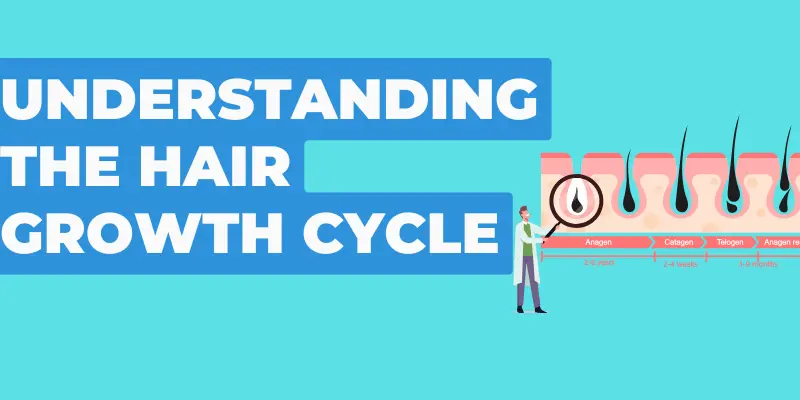The Great Debate Over Hair Growth – What You Need to Know
Published: 15 Oct 2024
Have you ever stood in front of the mirror, wondering why your hair just won’t grow past your shoulders? Or why is it thinning more now than last year? Welcome to the great debate over the hair growth topic that touches everyone, no matter your age or gender.
In this article, we’ll explore the pros and cons of hair growth, what affects it, and how to care for it properly. We’ll also bust common myths and share personal stories that prove what works.
Why Hair Growth Matters More Than You Think
Most people think hair is just about beauty. But it’s more than that. Hair plays a role in self-image, protection, and even body temperature control. According to Jim R. May and Lazorisak (2000), understanding hair growth is essential, especially when it comes to maintenance, treatment, or styling.
Understanding the Hair Growth Cycle
Understanding what is hair and knowing the hair growth cycle helps you take better care of your hair and notice problems early.

Hair grows in three stages: growing, resting, and falling out.
- Anagen Phase – the active growth stage
- Catagen Phase – the transition stage
- Telogen Phase – the resting and shedding stage
On average, hair grows about half an inch per month. Your genes, hormones, and lifestyle all affect how fast or slow this happens.
Factors That Influence Hair Growth
Several factors can affect your hair growth:
- Age – Hair grows more slowly as we age.
- Diet – Poor nutrition leads to weak hair.
- Stress – High stress disrupts the hair cycle.
- Health – Conditions like thyroid imbalance can trigger thinning.
Personal Story: I once had a client in her early 30s who suddenly started losing hair. After checking her diet, she realized she was missing key nutrients like iron and zinc. A few tweaks and her hair was back in just 3 months!
Types of Hair Growth – It’s Not All the Same
Different areas of your body grow different kinds of hair:
- Scalp Hair – Usually longer, denser
- Body Hair – Shorter and finer
- Facial Hair – Varies greatly with gender
That’s why care routines should match the type of hair you’re dealing with.
Advantages of Hair Growth
Healthy hair growth means fuller, stronger, and shinier hair—one of the key advantages of hair that’s well cared for and properly nourished.

- Good hair growth boosts confidence and reduces breakage or thinning.
Beauty & Confidence
Thick, shiny hair boosts your self-image. A good hair day can change your mood and energy.
Protection from the Environment
Hair protects your scalp from sun damage, dust, and pollution.
Helps Regulate Temperature
Hair helps retain body heat in winter and assists with sweat evaporation in summer.
Drawbacks of Hair Growth
Hair growth can lead to split ends and uneven lengths if not trimmed regularly. Managing new growth may require more time, products, and maintenance—but choosing eco-friendly hair products can make the process gentler on your hair and the environment.
Unwanted Hair
Facial or body hair can cause discomfort, especially for women. Managing it involves waxing, shaving, or laser treatments.
Hair Thinning or Loss
Androgenetic alopecia (genetic baldness) affects millions worldwide. It impacts confidence, especially during key life stages.
Personal Story: My uncle began losing hair in his early 40s. He tried over-the-counter oils, but nothing worked. A dermatologist recommended minoxidil, and within 6 months, he saw visible regrowth.
Medical Conditions
Conditions like PCOS, alopecia, or hirsutism can disrupt normal hair growth, leading to excess or loss.
The Role of Genetics in Hair Growth
Genetics plays a big role in how fast your hair grows and how thick it is. Your hair’s texture, growth rate, and even hair loss patterns are often inherited from your family.
Inherited Traits
Genes decide your hair type, length potential, and density.
Genetic Conditions
Issues like PCOS or alopecia are hereditary and affect growth patterns.
Advances in Genetic Research
Gene therapy and targeted medicine are offering new hope for reversing hair loss in personalized ways, just as treatments like straightening therapy are evolving to improve hair texture and manageability with less damage.
Gender Differences in Hair Growth
- Men often have more body and facial hair due to testosterone.
- Women experience shifts in hair growth due to pregnancy, menopause, or birth control.
Gender-Based Hair Products
Men may need beard oils and DHT blockers. Women benefit from thickening serums, hormonal treatments, or even a DIY hair serum made with natural ingredients to support healthier growth.
Natural Remedies for Hair Growth
- Aloe Vera – Soothes and hydrates the scalp
- Rosemary Oil – Promotes blood circulation
- Ginseng Root – Stimulates follicle growth
Dietary Support
Eat foods rich in:
- Proteins: eggs, fish
- Iron: spinach
- Omega-3s: nuts, seeds
Lifestyle Tweaks That Boost Hair Growth
- Manage stress with yoga or breathing exercises.
- Sleep well– 7 to 8 hours a night is ideal.
- Avoid chemical overload– limit dyes and heat tools.
Personal Story: A client who wore tight ponytails daily developed traction alopecia. After switching to looser styles and deep conditioning weekly, she noticed new baby hairs in just 2 months.
Medical Treatments for Hair Growth
Medical treatments like minoxidil and finasteride can help boost hair growth and slow down hair loss. As part of the evolving Science of Hair, dermatologists may also recommend PRP therapy or laser treatments for stronger, healthier hair regrowth.
Over-the-Counter Options
- Minoxidil – Promotes scalp circulation
- Biotin Supplements – Supports keratin production
Prescription Solutions
- Finasteride – Blocks DHT (mostly for men)
- Spironolactone – Hormonal treatment for women
Surgical Options
- Hair Transplants – Move follicles from thick areas to bald patches
Hair Care Tips for Maximum Growth
Keep your scalp clean, eat a balanced diet, and trim regularly to support healthy hair growth. Use gentle products, avoid heat damage, and massage your scalp to boost blood flow and encourage growth.
Use the Right Products
Choose shampoos and conditioners based on your hair type- dry, oily, frizzy, or fine.
Regular Trims
Cut hair every 6-8 weeks to avoid split ends.
Scalp Care
Weekly scalp massages and gentle exfoliation improve blood flow and reduce buildup.
Common Hair Growth Myths-Busted!
Trimming your hair doesn’t make it grow faster—it just keeps the ends healthy. Wearing hats or brushing often won’t cause hair loss—these are just common hair growth myths, busted!
Myth 1: Trimming Makes Hair Grow Faster
Nope. Trimming prevents breakage but doesn’t affect root growth.
Myth 2: Stress Causes Immediate Hair Loss
It usually takes weeks to show up.
Myth 3: Daily Shampooing Is Bad
Not always! It depends on your scalp type and lifestyle.
What the Future Holds for Hair Growth
The future of hair growth looks promising with advanced treatments like stem cell therapy and genetic research.
Laser Therapy & Stem Cell Research
Promising results are emerging for alopecia and thinning hair.
Personalized Solutions
Tailored treatments using your DNA profile will soon be the norm.
Holistic Approaches
Combining diet, stress relief, and safe treatments gives long-term results.
Final Thoughts
Hair growth is more than just biology- it’s about identity, confidence, and care. Whether you’re battling hair loss or just want healthier strands, knowledge is your best tool. From science to self-care, the journey to better hair starts with understanding your roots- literally.
FAQs
Hair growth can slow down for many reasons, including the natural aging process, where follicles become less active. Poor nutrition, lack of protein, iron, or vitamins can weaken hair health and reduce growth speed. Hormonal changes, especially from thyroid problems or menopause, also play a role. Stress, illness, or scalp conditions like alopecia can further disrupt the cycle.
On average, hair grows about half an inch (1.25 cm) each month, which equals around 6 inches (15 cm) per year. However, genetics play the biggest role in how fast your hair grows. Lifestyle factors such as diet, stress, and sleep quality can also affect growth rate. Some people may notice slightly faster or slower growth depending on their overall health.
Hair grows in three main stages, each lasting different amounts of time. The anagen phase is the active growth stage, lasting several years, where most of your hair is at any given time. The catagen phase is a short transition where growth slows, and the follicle shrinks. Finally, the telogen phase is the resting and shedding stage before new hair replaces the old one.
Trimming your hair doesn’t actually increase growth speed because growth happens at the scalp, not the ends. However, trimming split ends prevents them from traveling up the hair shaft and causing more damage. This makes hair look healthier, thicker, and longer over time. So while it doesn’t change the rate, it helps maintain better growth results.
Yes, stress can trigger a condition called telogen effluvium, where more hair enters the shedding phase than usual. The shedding typically appears a few weeks or even months after the stressful event. While this hair loss is usually temporary, it can feel alarming. Managing stress with rest, relaxation, and healthy habits can help hair recover.
Foods rich in protein, iron, biotin, and omega-3 fatty acids are essential for healthy hair. Eggs, lean meats, and nuts provide the building blocks for strong strands. Leafy greens like spinach and kale boost iron and vitamin C for circulation. Fatty fish like salmon or mackerel supply omega-3s that keep the scalp nourished.
The best treatment depends on the cause, but some proven solutions exist. Minoxidil is an over-the-counter topical that stimulates follicles, while finasteride helps men by reducing DHT, a hormone linked to hair loss. Lifestyle improvements like balanced nutrition, scalp massages, and stress management support results. For advanced cases, professional treatments like PRP therapy or hair transplants may be considered.
Yes, certain oils can stimulate the scalp and improve conditions for hair growth. Rosemary oil is known to boost circulation and has shown results similar to minoxidil in studies. Castor oil strengthens roots and adds thickness, while peppermint oil can energize follicles. Regular scalp massages with these oils improve blood flow and promote healthier growth.
As we age, hair follicles gradually shrink and become less active, producing thinner strands. The growth cycle also shortens, meaning new hairs don’t grow as long or as thick. Hair may become drier and more fragile due to reduced oil production. This is why many people notice thinning or slower-growing hair with age.
It depends on the cause of baldness. If hair loss is due to temporary issues like stress, illness, or nutrient deficiency, regrowth is often possible. In cases of genetic baldness (androgenetic alopecia), treatments like minoxidil, finasteride, or hair transplants can help. Early intervention gives the best chance of restoring fuller hair.

- Be Respectful
- Stay Relevant
- Stay Positive
- True Feedback
- Encourage Discussion
- Avoid Spamming
- No Fake News
- Don't Copy-Paste
- No Personal Attacks

- Be Respectful
- Stay Relevant
- Stay Positive
- True Feedback
- Encourage Discussion
- Avoid Spamming
- No Fake News
- Don't Copy-Paste
- No Personal Attacks





